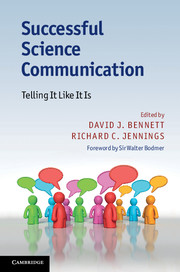Book contents
- Frontmatter
- Contents
- Foreword
- Authors' biographies
- Introduction Public engagement in an evolving science policy landscape
- Part I What it helps to know beforehand
- Part II Policy-makers, the media and public interest organisations
- Part III What you can do and how to do it
- Part IV And finally, evaluating and embedding science communication
- 26 Evaluating success: how to find out what worked (and what didn't)
- 27 Effectively embedding science communication in academia: a second paradigm shift?
- Index
- Plate section
- References
26 - Evaluating success: how to find out what worked (and what didn't)
Published online by Cambridge University Press: 05 May 2013
- Frontmatter
- Contents
- Foreword
- Authors' biographies
- Introduction Public engagement in an evolving science policy landscape
- Part I What it helps to know beforehand
- Part II Policy-makers, the media and public interest organisations
- Part III What you can do and how to do it
- Part IV And finally, evaluating and embedding science communication
- 26 Evaluating success: how to find out what worked (and what didn't)
- 27 Effectively embedding science communication in academia: a second paradigm shift?
- Index
- Plate section
- References
Summary
Why evaluate?
The question: ‘So did it work?’ can be daunting for both new and experienced science communicators. The answer lies through effective evaluation, which can be one of the most interesting aspects of the engagement process. Kolb (1984) describes a cycle of conceptualisation, experiment, experience and reflection as crucial to the learning process, as recognised in Figure 26.1.
Evaluators often talk about their work being used to ‘prove’ or ‘improve’ activities. Essentially evaluation can be used to improve an activity or programme by identifying and addressing limitations, or can look at an activity to arrive at a judgement of its success or worth. These findings are useful to check if your activity is achieving what it set out to, as well as in providing evidence for those interested in supporting your work such as funders.
- Type
- Chapter
- Information
- Successful Science CommunicationTelling It Like It Is, pp. 403 - 422Publisher: Cambridge University PressPrint publication year: 2011
References
- 2
- Cited by



